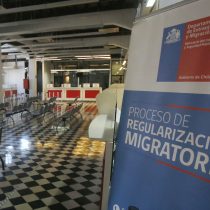
As much or more important than the new immigration law just enacted by President Piñera is its content and the accompanying discourse. The context in which it is located is the inscription of Chile as a country of regional destination on the Latin American migration map, begun in the late 90s of the last century and accelerated in the last decade. Today foreigners reach almost one and a half million people of whom almost 500 thousand correspond to Venezuelans, followed by Peruvians, Haitians and Colombians. Economic crises, authoritarianism, inflation and the lack of political and institutional guarantees in different countries of the region have led to South American migration to Chile and, in venezuela, the largest diaspora on the continent in recent history. Added to this is an erratic and discretionary policy of the government on visas to Venezuela that went from President Piñera’s invitation to the Venezuelan people in Cúcuta (February 2019), to the creation of the democratic responsibility visa and subsequent imposition of a consular visa for those trying to reach Chile. Then came the COVID-19 pandemic and the impact on the continent with job losses, especially migrants in different countries in the region. All this has produced one of the worst humanitarian crises that we have ever seen in the villages of Colchane and Huara and in Iquique.
In this context, the content of the new law is interested because it replaces the obsolete Aliens Act of 1975 made during the military dictatorship and which, despite some accommodation, did not respond to the country’s reality in immigration matters. The new law does not consider the reality of the Southern Cone where in a normal situation, without pandemic, there are various border movements – some ancestral – that allow to meet the needs of supply, health, leisure, work and trade of the local population. Not only that, but it also rigidizes the possibility of changing immigration status, criminalizing people who, once in Chile, want to stay and work. This is because it changes the way residence permits are handled which must be processed in Chile’s consulates abroad, for which it will have to be done before embarking on the journey or, if not, obliges them to return to the country of origin. This makes no sense to hundreds of undocumented people who invested all their resources, especially from Venezuela, on long and painful journeys. While it establishes a process of extraordinary regularization, this will be only for those who entered Chile until 18 March 2020, just before the closure of borders and the economic crisis caused by the COVID pandemic.
The new law also gives broad powers to the POI to return persons entering through unsused steps, which is a serious violation of the human rights of migrants because there will be no possibility of exposing their particular situation, let alone the possibility of accessing advice or defense of a lawyer or body expert on the subject. And worse, it ignores that people are often victims of migrant trafficking or human trafficking, and that a return can put their lives at risk and make crime unvisitable. At the same time, it is unaware of the law on shelter procedure in force in Chile and ignores the international human rights conventions that Chile has ratified and which are in force. Thus the new migration law will generate more irregularity because it does not take care of the reality of thousands of people living in Chile undocumented, without giving them the possibility to access a residence permit. Indeed, scientific output indicates that restrictive laws, barriers, and walls do not stop migration flows, as has been widely demonstrated in Central American caravans to the United States, but makes them more dangerous and tragic.
To the content of the law is added a discourse based on the criminalization and stigmatization of those who arrived in the context of pandemic fleeing poverty and violence at closed borders making the journey even more dramatic. This way of transmitting regulations – designed from militarization, sanction and expulsion – promotes xenophobia and reproduces institutional racism. This only exacerbates the humanitarian crisis of hundreds of foreigners, many of them on the street, by associating them with organized crime, trafficking inersonas and drug trafficking as we saw in the act of enactment.
Immigration laws and discourses are almost always a reflection of receiving societies, so ad portas of a constituent process, we only have hope to reverse this situation. Deepening the democratic values and recognition of the other as equal is the basis of a just and equitable society, but this must be for both residents and newcomers.
The content poured into this opinion column is the sole responsibility of its author, and does not necessarily reflect the editorial line or position of El Mostrador.
"El reclamo puede ser genuino, pero construido sobre una mentira", apuntó el presidente Javier Milei…
El gobernador de la provincia de Buenos Aires, Axel Kicillof, encabezó un acto en Ensenada…
El diputado nacional de La Libertad Avanza, José Luis Espert, expresó su confianza en la…
Tras la masiva reaparición de Cristina Fernández de Kirchner, el presidente Javier Milei apuntó contra…
El principal propósito de la nueva comisión es evaluar los recursos humanos en el Senado,…
En una medida que busca redefinir las condiciones de los seguros de automóviles en Argentina,…
Esta web usa cookies.